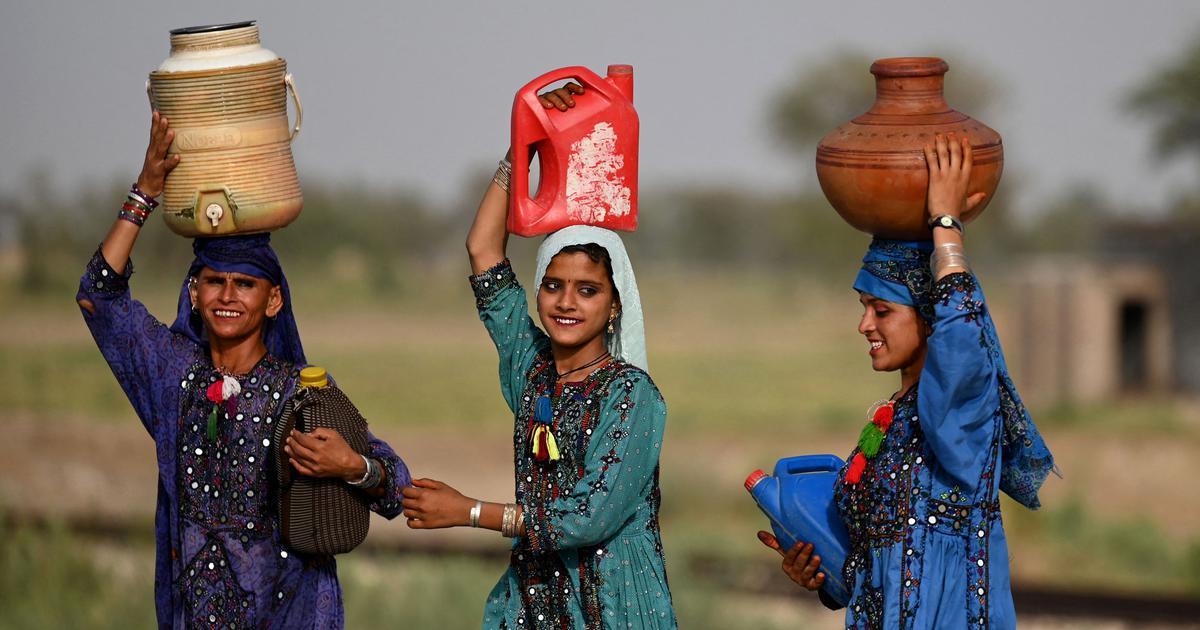
Water Mismanagement And Overexploitation Drive Pakistan Towards Absolute Water Scarcity
Image/AFP.
The groundwater level in Pakistan has been depleting at an alarming rate thanks to the mismanagement of water resources and the overexploitation of groundwater extraction. [1] The fast-depleting groundwater table has made water scarce, even 400-500 feet under the ground in many cities. [2] [3] The population continues to grow at a high rate, and per capita water availability declines; Pakistan is on the way to facing 'absolute' water scarcity soon.
Injudicious use of surface water, especially for irrigation purposes, is a major problem. The water mismanagement has led to the overexploitation of groundwater resources. The groundwater level is declining by one metre every year.[4] According to the World Resources Institute (WRI), Pakistan is among the 25 countries that face extremely high water stress.“Along with the crisis posed by rivers and streams running dry, Pakistan's dangerously depleted groundwater levels have left most parts of the country parched,” reads an article published in the Pulitzer Centre.
Pakistan Institute of Development Economics (PIDE) revealed that over 80 percent of the population was coping with living without adequate water.[5] Incidentally, per capita water availability in Pakistan has reduced from 5,260 cubic meters to just 908 cubic meters in the past seven decades.[6] Experts have warned about the severe threats to Pakistan's sustainable development and economic growth as the country is overdrawing groundwater, considered the last resort of water supply.[7]
Making the water scarcity worse, agriculture in Pakistan has become the biggest exploiter of groundwater, according to research by Pakistani experts.“Groundwater consumption has also increased several times over the last 70 years or so. The agriculture sector consumes nearly 94 percent of the total groundwater extraction. We are not only wasting our stored surface water but also mistreating groundwater. Resultantly, groundwater levels in the country are dropping sharply,” reads the report.[8]
The problem of groundwater exploitation is not limited to just overdrawing. A significant amount of extracted groundwater is wasted due to poor irrigation infrastructure.[9]“Due to the unpredictability of canal water supplies, farmers across Pakistan have resorted to groundwater pumping, which is going on in a highly unregulated manner. Even in the domestic sector, unmonitored groundwater misuse is on the rise, which is sharply decreasing the most precious commodity of nature,” reads a research paper by Islamabad-based NUML.[10]
While the total water requirement in the capital city of Islamabad is around 220 million gallons per day, the local municipal agency 'Capital Development Authority' (CDA) could provide only 60-70 million gallons per day. The rest of the water needs are carried out by people themselves by drilling tubewells.[11] People have been left with no option but to dig borewells to survive.“I had to get a water bore because the CDA does not do its job of supplying water. What do I do without water?,”
said Haji Sohail Shehzad, a resident of Islamabad.[12]
Indus Basin aquifers are the world's second-most overstressed underground water reserve even as the overexploitation of groundwater in Pakistan continues to occur, warned a report by PIDE.“In addition to surface water, Pakistan's groundwater resources-the last resort of water supply-are severely overdrawn, mainly to supply water for irrigation. If the situation remains unchanged, the whole country may face 'water scarcity' by 2025,” reads the report.[13]
Experts criticized the Pakistani rulers for failing to take necessary action to prevent groundwater exploitation and improve water availability. Dr Muhammad Aslam Tahir, former Chairman of the Pakistan Council of Research in Water Resources (PCRWR), said the depletion of river water resources and excessive groundwater extraction further complicated the situation, necessitating comprehensive long-term planning and policy implementation.[14]
Pakistan's powerful military wields greater influence in water policymaking and governance, and its hegemony obstructed efforts to improve the water availability situation despite supply-demand imbalances, climate shocks, and regional hydro-politics, said Dr Atal Ahmadzai, a visiting assistant professor at New York-based St. Lawrence University.“The country's highly centralized and elite-serving water governance structures, controlled by the military, further contribute to Pakistan's precarious water scarcity,” he said.[15]
Sources:
[1]
[2]
[3]
[4]
[5]
[6]
[7]
[8]
[9] #:~:text=Pakistan%2C%20in%20particular%2C%20faces%20a,the%20inefficiency%20of%20irrigation%20networks.
[10]
[11]
[12]
[13]
[14]
[15] #:~:text=Pakistan%20is%20currently%20facing%20a,extremely%20high%20water%2Drisk%20nations.
DISCLAIMER – The opinions expressed in this publication are those of the authors. They do not purport to reflect the opinions or views of The Khaama Press News Agency . We welcome opinions and submissions to Khaama Press Opinions/Exclusives – Please email them to ... .
ShareFacebook Twitter WhatsApp Email Print Telegram
Legal Disclaimer:
MENAFN provides the
information “as is” without warranty of any kind. We do not accept
any responsibility or liability for the accuracy, content, images,
videos, licenses, completeness, legality, or reliability of the information
contained in this article. If you have any complaints or copyright
issues related to this article, kindly contact the provider above.


















Comments
No comment